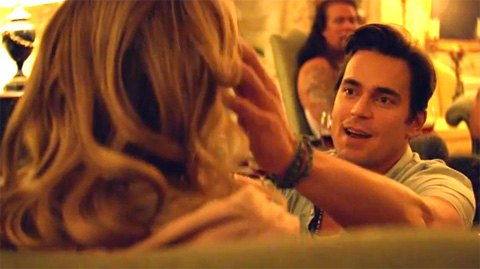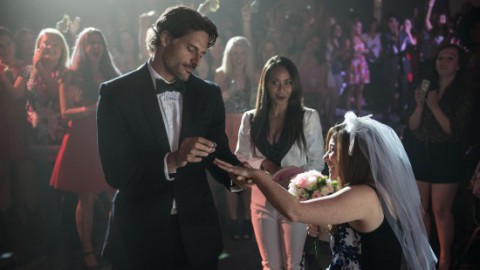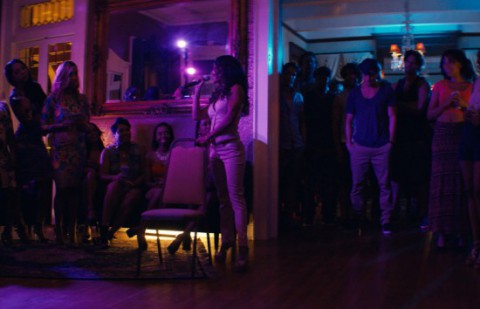“Any God Worth Believing in Sends You Dudes in Thongs When in Need”: Exploring Women’s Pleasure in Magic Mike XXL
Post by Kristen Warner (University of Alabama) and Chelsea Bullock (Georgia Institute of Technology)
Facts about Magic Mike XXL: While there is a narrative structure, the exposition moves at the speed of light and is primarily embedded in passing conversation between two key transition scenes. There’s neither a dramatic beat nor realistic stakes. XXL is, as the character Richie (Joe Manganiello) repeatedly asserts, “the last ride.”
Yet if that is so, and the film is truly that simple, what makes Magic Mike XXL one of the most fun and pleasurable films we have watched in years? You may think it was just the male bodies on screen body-rolling and enacting acrobatics that often defy gravity.
You would be partially correct.
But there’s more to it because men dancing in sexual manners on-screen, while certainly titillating, is not enough to mark a film like this as a wholly pleasurable experience. Instead, consider the premise that the male cast of XXL exist for two purposes: 1) their (homosocial) relationships with each other and 2) their sole determination to entertain at the pleasure of the women whose paths they cross. The men of XXL are not martyrs or altruistic saints; they are, however, representations of men women can imagine exist–agents activated solely for their pleasure.
What’s more is that these men vacillate between gently approaching and explicitly ravaging the desires of the women in the film, but always with an earnest conviction that honors rather than belittles those to-be-looked-at desires.
Consider the scene in which Ken (Matt Bomer) joins in the chorus of women coaxing the middle-aged, white southern mama to contribute details about her marriage within the “cone of silence.” In a moment of vulnerability, she acquiesces and says that she and her husband haven’t had sex with the lights on, ever. Now embarrassed, she marshalls a happy memory of their favorite song, Bryan Adams’s “Heaven.” Ken responds with gentle empathy and breaks into an acapella solo of the song while holding her as she rests her head on his shoulder, indulging herself in this very public, yet, very intimate moment. It’s cheesy and undoubtedly draws cynicism alongside delight, but it’s representative of how the film never–for even a moment–allows irony or shame to mar an uncomplicated celebration of women’s pleasure.
Or consider the wedding (Lord have mercy that man in a tuxedo) performance at the aptly named “Stripper Convention” that ends with the bride strapped into a sex sling and Richie fully dominating the space around her. A palpable sexual energy emanates through the deft command he has over his body and the dynamic way in which he fills the stage, orbiting around the woman in the sling, as Nine Inch Nail’s “Closer” reinforces the intense lust Richie has for his bride. Richie performs an aggressive kind of dominance but his focus is constantly on his beloved, his commitment to her pleasure unwavering.
These moments may seem a small matter but think about how rare women’s pleasure is instigated, indulged, or permitted in film or television. That women in XXL have the (welcomed) opportunity to stare–to gaze–at these men’s bodies without shame, mockery, or judgment is not something often seen or considered in mediated texts. The reverse, we know, is all too true.
So what does it mean when cinematographer Peter Andrews (a.k.a., Steven Soderbergh) frequently lenses central character Mike Lane (Channing Tatum) in shots with so little headroom that the majority of his face is cut out of the frame, allowing us to gaze only at his mouth?
And what does it mean when the main cast visit Domina, a male entertainer establishment housed in a moss-covered plantation in Savannah, owned and operated by a Black woman named Rome (Jada Pinkett-Smith) who services the pleasures of southern Black women of all shades, sizes, and ages with a steady stream of Black male bodies who also welcome being looked at?
And what does it mean that when the smart and cynical young white woman Zoe (Amber Heard) who more than likely stands in for a significant portion of the film’s audience–those girls dragged by friends to giggle at half naked men gyrating to Ginuwine’s “Pony”– feels down in the dumps about her “not so wise” life decisions that all Mike desires is to see her (and maybe us) get her/our smile back? [*]
The sincerity of these performances is a significant part of what we found remarkable about this film. As Kristen already argued, XXL makes it clear that writing characters with dimension and cultural specificity doesn’t have to be overwrought or difficult. Similarly, XXL offers a frame for and an articulation of women’s pleasure and desire that doesn’t diminish, degrade, or mock. The film is inherently playful, but that play smartly avoids defaulting to well-worn representations of women’s pleasures built upon their trivialization (we see you, The Bachelorette). XXL is what it looks like when grown-ass men pay real close attention, take grown-ass women at their word as fully engaged and sophisticated sexual beings, and consider women’s smiles as illustrations of satisfaction and pleasure rather than as a service to which they–as men or entertainers–are entitled.
Ultimately, what we saw in XXL were possibilities of adding new iconography to the existing lexicon to the way we as women media scholars discuss the intersectionally raced, gendered, and very classed pleasures found within the women’s film. In this instance, it is visible through its attention to the centrality of women’s sexual desires vis-à-vis the deployment of male bodies in the service of maintaining that pleasure. In the words of Rome, “It’s not bro time; it’s show time.” In XXL, the bros are always sincerely delighted to perform for women’s pleasure.
______________
[*] And not in some creepy, patriarchal, “show me a smile cause you’re pretty when you smile” manner either. XXL resists a patriarchal position because the desire for smiles is not about reciprocity or a centering of male pleasure and desire. It’s about taking pleasure (whether Mike or Zoe) in women’s embrace of their own desires.








